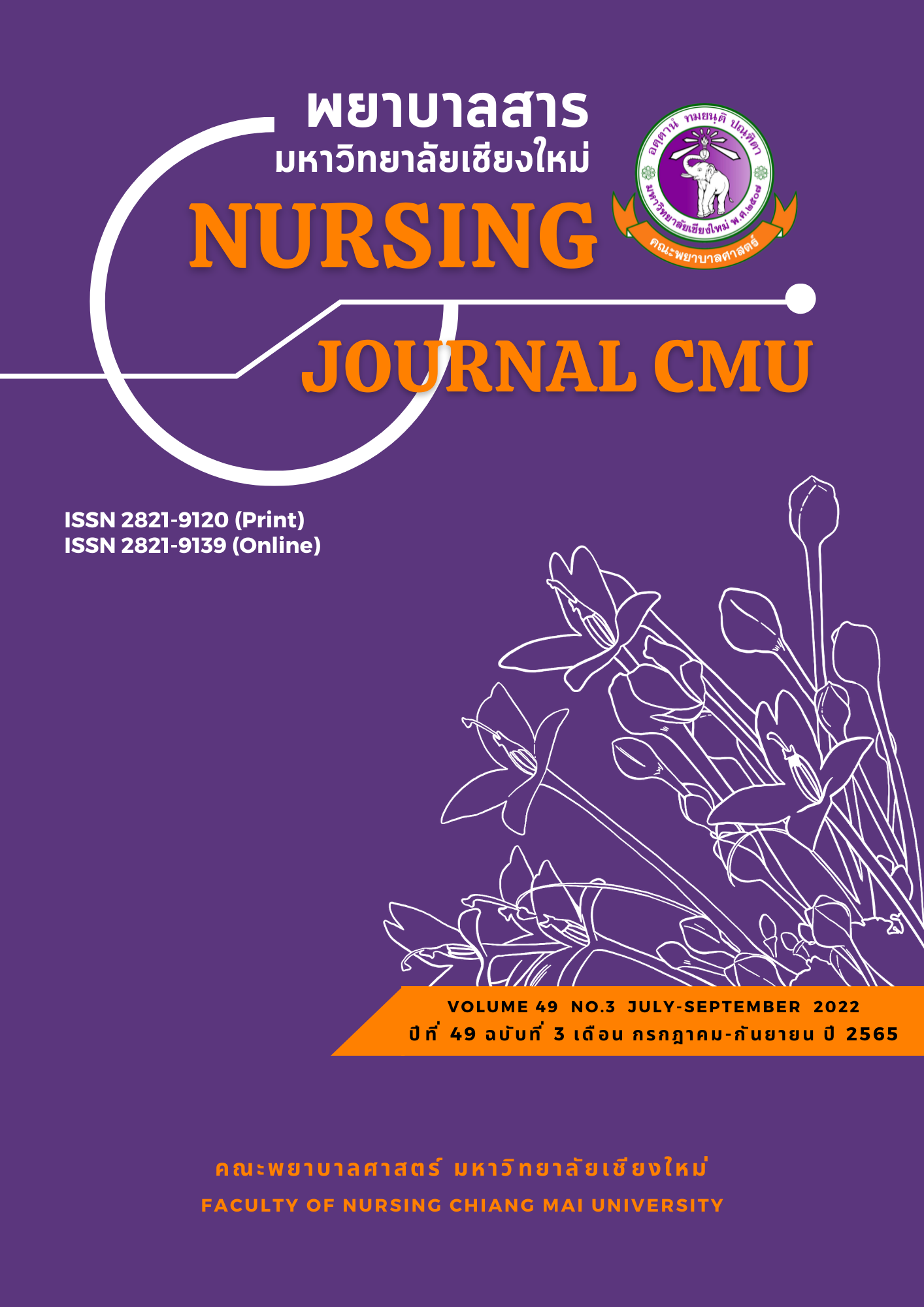Development of Nursing Project Evaluation Tools based on the Thai Qualification Framework for Higher Education and 21st Century Skills for Nursing Students
Keywords:
Nursing project, Evaluation tools, Thai Qualification Framework for Higher Education, 21st century skills; Nursing studentsAbstract
The objectives of this developmental research were to develop and examine the quality of learning outcomes evaluation tools for nursing students based on the Thai Qualification Framework for Higher Education and 21st century skills. The participants consisted of 101 and 136 nursing students in the 2018 and 2019 academic years, respectively. Instruments included a 12-item, 4-level evaluation tool. The data were analyzed for the quality of the developed evaluation tools using Content Validity Analysis, Reliability and Factor Analysis.
The nursing project evaluation tools were developed with 12 items. The content validity of the tools was derived from IOC 0.93. The internal consistency reliability (α) of the tools was 0.691. A confirmatory factor analysis revealed a chi-square corresponding value of 48.209, at an independent degree of 51, p=0.5852, CFI=1.000, TLI=1.033, RMSEA=0.000 and SRMR=0.057, between the developed model and the empirical data.
The outcome of this study may lead to further research. The tools were suitable to be used. Policies regarding the continuous learning outcomes evaluation tools implementation should be established.
References
Academic Affairs, Srimahasarakham Nursing College. (2012). Bachelor of nursing Science program (amendments B.E. 2555). Mahasarakham: Nursing College. (in Thai)
Amphansirirat, A., Chanchareun, K., Jeenaphan, P., Sungwanawat, W., Watcharaviwat, A. & Siwadumrongphong, W. (2013). The development of instrument to evaluate learning outcomes as the Thai qualifications framework for higher education, nursing curriculum (Revised Version B.E. 2555), Southern College of Nursing and Public Health College Network). Journal of Health Science Research, 7(2), 1-9. (in Thai)
Bellanca, J., & Brandt, R. (Eds.). (2010). 21st century skills: Re thinking how students learn. Bloomington: Solution Tree Press.
Cronbach, L. J. (1990). Essentials of psychological testing. (5th ed.). New York: Harper Collins.
DeVellis, R. F. (2003). Scale development: Theory and applications. (2nd ed.). Newbury Park: SAGE.
DeVellis, R. F. (2012). Scale development. United States: SAGE.
Hu, L. T., & Bentler, P.M. (1999). Cutoff criteria for fit indexes in covariance structure analysis: Conventional criteria versus new alternatives. Structural Equation Modeling, 6(1), 1-55.
Jiraro, P. (2013). Objective, Indicator and Criterion for Project Evaluation. Journal of Education, 24(3), 25-36. (in Thai)
Loewenthal, K. M. (2001). An Introduction to Psychological Tests and Scales. Padstow: TJ International.
Mueller, R. O. (1996). Confirmatory factor analysis. In Basic principles of structural equation modeling: An introduction to LISREL and EQS. New York: Springer-Verlag.
Office of the Education Council. (2006). National education act B.E. 2542 (1999) and amendments (Second National Education Act B.E. 2545 (2002). Bangkok: Ministry of Education Kingdom of Thailand. (in Thai)
Office of the National Education Commission. (2006). National qualifications framework for higher education in Thailand: Implementation handbook. Bangkok: Office of the National Education Commission. (in Thai)
Panich, V. (2017). Ways to create learning for students in the 21st century. Walailak Journal of Learning Innovations, 1(2), 3-14. (in Thai)
Praboromarajchanok Institute. (2012). Bachelor of Nursing Science program (Revised Version B.E. 2555. Nonthaburi: Praboromarajchanok Institute for Health Workforce Development (PIHWD). (in Thai)
Rujkorakarn, D., Hornboonherm, P., Kochamat, A., Nantsupawat, W. & ingkanont, P. (2016). A construction of the qualification standard for a bachelor’s degree in nursing in Thailand. Journal of Nursing Science & Health, 39(2), 109-117. (in Thai)
Suwannoi, P. (2018). The development of learning outcomes evaluation tools for student based on the Thai Qualification Framework for Higher Education. Khon Kaen: Institute for Human Resource Development, Academic Affairs, Khon Kaen University. (in Thai)
Turker, D. (2009). Measuring corporate social responsibility: A scale development study. Journal of Business Ethics, 85, 411–427. doi: 10.1007/s10551-008-9780-6
Zheng, J, You, L, Lou, T, Chen, N, Lai, D, Liang, Y, … Zhai, C. (2010). Development and psychometric evaluation of the dialysis patient-perceived exercise benefits and barriers scale. International Journal of Nursing Studies, 47, 166- 180.doi:10.1016/j.ijnurstu.2009.05.023
Downloads
Published
How to Cite
Issue
Section
License
Copyright (c) 2022 Nursing Journal

This work is licensed under a Creative Commons Attribution-NonCommercial-NoDerivatives 4.0 International License.
บทความที่ได้รับการตีพิมพ์เป็นลิขสิทธิ์ของวารสารพยาบาลสาร
ข้อความที่ปรากฏในบทความแต่ละเรื่องในวารสารวิชาการเล่มนี้เป็นความคิดเห็นส่วนตัวของผู้เขียนแต่ละท่านไม่เกี่ยวข้องกับมหาวิทยาลัยเชียงใหม่ และคณาจารย์ท่านอื่นๆในมหาวิทยาลัยฯ แต่อย่างใด ความรับผิดชอบองค์ประกอบทั้งหมดของบทความแต่ละเรื่องเป็นของผู้เขียนแต่ละท่าน หากมีความผิดพลาดใด ๆ ผู้เขียนแต่ละท่านจะรับผิดชอบบทความของตนเองแต่ผู้เดียว






